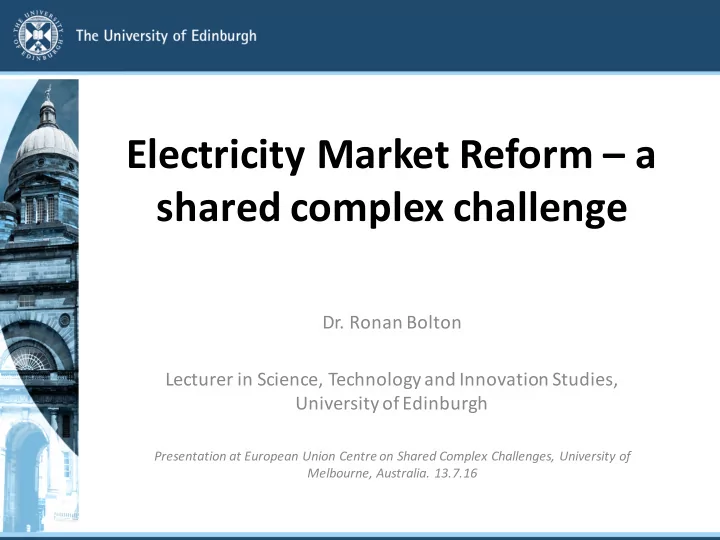

Electricity Market Reform – a shared complex challenge Dr. Ronan Bolton Lecturer in Science, Technology and Innovation Studies, University of Edinburgh Presentation at European Union Centre on Shared Complex Challenges, University of Melbourne, Australia. 13.7.16
Electricity market design – a shared and complex challenge
Overview 1. Research perspective: socio-technical systems and energy transitions (Science and Technology Studies - STS) 2. Key debate about electricity market design in Europe 3. The need to ‘open the black box’ of electricity system design
Large Technical Systems & Society "Electric power systems embody the physical, intellectual, and symbolic resources of the society that constructs them...electric power systems, like so much other technology, are both causes and effects of social change.” (Hughes, 1983)
A socio-technical approach • The ‘seamless web’ : “An artifact-either physical or nonphysical-functioning as a component in a system interacts with other artifacts, all of which contribute directly or through other components to the common system goal” (Hughes, 1987) • Socio-technical regimes : “the ‘deep structure’ that accounts for the stability of an existing socio- technical system…the semi-coherent set of rules that orient and coordinate the activities of the social groups that reproduce the various elements of socio-technical systems “ (Geels, 2011)
Energy transitions: Simple narratives of disruption and decline
Lessons from the history of energy transitions Energy Transitions: “A study of a fluid process, rather than understanding it as a pretext for establishing rigid barriers between specific energy eras…older sources of energy (muscle power, renewable resources) are not replaced totally by newer sources (fossil fuels, nuclear energy). Instead they are supplemented, complemented, or slowly displaced according to use" (Melosi, 2006) Melosi, M. 2006. “Energy Transitions in Historical Perspective.” In Energy and Culture: Perspectives on the Power to Work, edited by B. Dooley, 3–18. Aldershot: Ashgate.
Type I and II energy transitions Szarka 2016
Electricity markets in Europe
European electricity integration 1929: George Viel’s 400 kV network for Europe (Vincent Lagendijk)
1920s - Early regional power pools
Hidden integration ”The creation of a European electricity system remained for a long time separat e from the processes of political and economic integration that led to the EU. In fact, the notion of such a system was already conceived of during the interwar period and the process that led to its re alization was initiated after 1921" (Lagendijk, 214)
Early 1990s: A new phase of market liberalisation
Three energy packages
The “target model” and a new institutional architecture • Practical steps for implementing the 3 rd energy package “The internal market should be completed by 2014 so as to allow gas and electricity to flow freely” (European Council conclusion of February 4, 2011)
Structural changes in the European electricity system
Rise in investment
Falling demand
Falling prices
Source: Prof Mark O’ Malley. http://acee.princeton.edu/wp-content/uploads/Presentation-Final.pdf
http://blogs.shell.com/climatechange/wp-content/uploads/2015/01/10-Years-of-the-EU-ETS.jpg
Diverging views on electricity market design
EU Commission investigation • Launched in April 2015: “concerns that capacity mechanisms may unduly favour particular producers or technologies and that they may create obstacles to trade in electricity across borders” • EU also consulting on its ‘Market Design Initiative’
An interventionist trend
Electricity market reform processes
UK EMR – innovation friendly? “Encourage the investment we need to replace older power stations and provide backup for more intermittent and inflexible low-carbon generation sources” (Amber Rudd)
Germany’s ‘Electricity Market 2.0’ Capacity reserve for extreme events – key difference is plants taken out of • energy market 2.7GW Lignite reserve – achieving climate target and phase out by 2020 • BMWi, 2015
The new politics of electricity market design – towards hybrid markets Market purists - “remove all policy intervention that distorts • market prices and internalise the climate externality with a strong carbon price” Climate change planners - “minimise the financing cost of low- • carbon generation investments by insulating investors from market risk, introducing procurement auctions for power purchase agreements for low-carbon generation projects. Ultimately, following this logic would lead to the abandonment of competitive markets” IEA, 2016
Concluding remarks
Electricity market design as a form of ‘technopolitics’ “Many fundamental technical choices – such as choices about system design and programmatic development – have significant and inseparable political dimensions” (Gabrielle Hecht)
Electricity markets and system transition
Thank you!! Ø Contact: Ronan.Bolton@ed.ac.uk Ø Publications : http://www.research.ed.ac.uk/portal/en/persons/ronan- bolton(118dbdea-39f9-41b5-a2eb-717c46ed21ca)/publications.html Ø Twitter : @EdinburghEnergy Ø Energy and Society Research Group: http://www.sps.ed.ac.uk/research/research_centres/cross_school_re search_clusters/energy_and_society_research_group
Recommend
More recommend